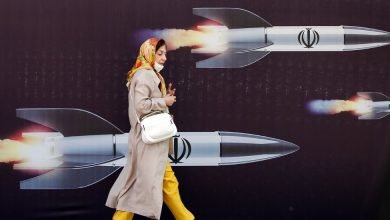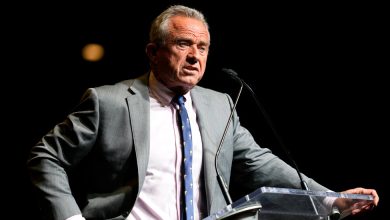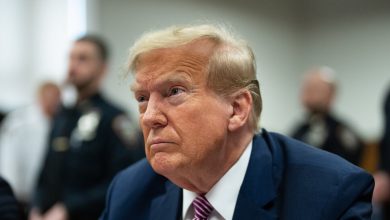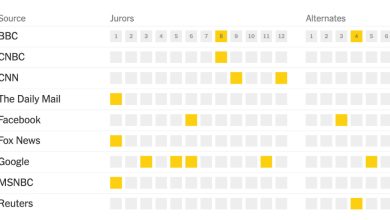Edward J. Bronson, Who Fought for Fairer Trials, Dies at 91

Edward J. Bronson, a political science professor whose research into potential bias was credited with improving the impartiality of criminal juries nationwide, died on April 25 at his home in Denver. He was 91.
His death was confirmed by his son Jeremy.
Armed with specially commissioned surveys and studies of the predilections of potential jurors, Dr. Bronson, who taught at California State University, Chico, from 1969 to 2003, was often enlisted by defense lawyers for his advice and as an expert witness.
He was particularly sought after in capital punishment cases or cases in which the defendants carried added baggage because of their backgrounds or the barbarity of their crimes.
In two high-profile cases, he argued that the defendants in the Oklahoma City and Boston Marathon terrorist bombings be tried out of town because the jury pool for their trials had been prejudiced by publicity. His findings were cited in judges’ decisions that potential jurors could not be excluded from capital cases solely because they were opposed to the death penalty.
“Ed was particularly focused on the rights of men and women who, because of the crime charged or their race, ethnicity or both, were most likely to be at risk of being tried by jurors who were predisposed to convict and sentence the defendant to death,” Prof. Elisabeth Semel, a director of the Death Penalty Clinic at the University of California, Berkeley, School of Law, said in an email.
“Ed’s work,” she added, “more often took him to rural counties where anti-Native or anti-Black discrimination was entrenched, and where there was tremendous prosecutorial and judicial hostility to the notion that the accused could not be fairly tried where the crime occurred.”
Denise de La Rue, a jury and trial consultant, cited in an email Dr. Bronson’s “dedication to justice, especially for those marginalized or whose lives hung in the balance.”
His analysis of pretrial publicity was cited in the decision to move the trials of Timothy J. McVeigh and Terry L. Nichols in the 1995 bombing of the Alfred P. Murrah Federal Building in Oklahoma City, which killed 168 people — the deadliest case of domestic terrorism until Sept. 11, 2001.
Their trial was shifted from Oklahoma City to Denver, where Mr. McVeigh received the death penalty but Mr. Nichols was spared execution. They were tried separately, which Dr. Bronson said demonstrated that in cases where there are multiple defendants, it’s less likely that they will all be sentenced to death.
“The severance motion very likely saved Nichols’s life,” Jeremy Bronson said.
He estimated that 40 percent of the change-of-venue applications in which his father participated were successful.
However, Dr. Bronson was unsuccessful in his argument that the trial of Dzhokhar A. Tsarnaev, accused in the 2013 Boston Marathon bombing — which killed three people and injured nearly 300 others — be moved out of Massachusetts because, as in the Oklahoma City case, the entire state could be considered a victim and therefore biased.
Dr. Bronson told the court that the word “terrorist” had been used 620 times in articles related to Mr. Tsarnaev in The Boston Globe alone. “Obviously a passing reference is not prejudicial, but does show the pervasive impact of the case,” he wrote.
The court declined the request for a change of venue. Mr. Tsarnaev was tried in Boston, convicted and sentenced to death. The death sentence was vacated on appeal in July 2020, but the United States Supreme Court reinstated it this year.
“I would not judge his success just by whether a trial judge granted a change of venue,” Stephen B. Bright, a visiting lecturer at Yale University who was director of the Southern Center for Human Rights in Atlanta from 1982 to 2005, said in an email.
Edward Jerome Bronson was born on May 10, 1930, in Chicago to Louis Bronson, an executive of Armour & Company, the canned meat processor, and Helen (Steinberg) Bronson, a homemaker. After her husband’s death in 1945, she moved the family to Denver, where she ran a liquor store.
From 1948 to 1955, Dr. Bronson served in the Utah National Guard, the Air Force and the Virginia Air National Guard.
After earning a Bachelor of Science degree from the University of Denver in 1957, he graduated from the University of Denver law school in 1959. He earned a Master of Law degree from New York University in 1961 and a doctorate in political science from the University of Colorado, Boulder, in 1972. He was a Fulbright scholar at the Center for Judiciary Studies in Lisbon in 1992.
In 1962, he married Marion Dorothy Crystal, who survives him, along with their son and four grandchildren. Another son, Mark, died.
At Chico State, where he taught constitutional law and became professor emeritus, Dr. Bronson founded the public law, criminal justice and paralegal certificate programs; the Pre-Law Society; and the Student Law Union of Minorities. He also founded the university’s student-led Community Legal Information Center.
Paraphrasing Winston Churchill’s observation about democracy, Dr. Bronstein told The New York Times in 2010 that the jury system was “the worst possible system, except for all the others.”
If anything, he added, juries are better equipped to overcome personal prejudices than judges. “Those biases get worked out much better,” he said, “where there’s collective wisdom of people on both sides.”
On the other hand, Dr. Bronson told The Times: “The scary thing about it is, to find out what really juries are doing might question some of the basic assumptions of its legitimacy. To find out how stupid some of the decisions and opinions are, maybe that’s something we might not as soon want to find out.”




